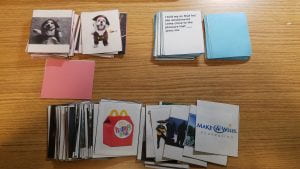With Cards Against the Internet, I am trying to recreate a scenario that explores individual humor through a social party card game with an objective reflection of the best and worst that the Internet has to offer. The game rules play out similarly to the actual Cards Against Humanity card game, however with changes to the answer cards (which are now Google Image results) as well as an additional “Bamboozle” mechanic. With the trend of memes of dogs in costumes that “Bamboozle” (or senseless dog pictures with the main purpose of “startling” its viewers), this unpredictability and spontaneity of the Internet is integrated directly within the mechanics of the game. Players can recreate an instance of online media culture, except share their own personal opinions and interpretations in a physical space. The question of what collectively is humor and what things can be accepted in a social setting (without the usual sense of security and anonymity behind a computer screen) is the crux of this game.
The game draws characteristics of Dada art, where one of the underlying motifs is generating questions about society, in this case posing the question of whether the unrestrained freedom of the Internet creates a culture where people are accustomed to instant gratification, randomness, and the profane. A specific example can be drawn from artist and co-founder of the Dada movement, Hugo Ball and his 1916 poem Karawane, one that is made up entirely of sounds (Dada: Zurich, Berlin, Hanover, Cologne, New York, Paris. pg 43). The performance of Karawane was meant to instigate unconventional ideas at the time to its audience, in this case the experimenting with the limits and communication of human language. What is interesting is the fact that Karawane still relies on the fundamental structure of syllables, rhyme, and prose, however changes only the meaninglessness of words through sound. In essence, it is appropriation. With Cards Against the Internet, the rules and questions have not changed drastically based off of the original Cards Against Humanity, however the answer content has shifted towards a representation of random Internet searches. An observed response to my game is the randomness and wide response of choices that is provided due to the nature of Internet pictures. Ideally, it is meant to question our association and reliance to the Internet, our browsing, and how it influences us in a public setting.
Design Iterations and Testing
Initially, the idea was brought into consideration after playing Cards Against Humanity and observing the rise of Meme Card games. They are both games I enjoy playing, but both lacked an element of “dark humor” due to restrictions as well as the fact that the randomness came from an unnatural place (answer choices that were purposefully made to sound drastic, yet the exaggeration makes it worse). Combining the aspect of a “humorous” party game and appropriating it with the wide honest results of Google Image searches (from history, people, items, events), the list is endless. The Internet drives the humor in the game, and surprisingly people are usually very drawn and open to the idea of Internet humor. I’ve personally given it a second thought and consider the Internet to be a “wild and lawless” place where profanity is left unchecked, and realized its effect on how it has started to normalize the youth of this generation.
I first created a list of potentially funny questions keeping in mind the idea of making them generic enough that both nouns and verbs can potentially be an answer choice. I then created a large list of images that I could use, and went ahead to find pictures of all of them on Google Images, along with as many pictures of dogs in costumes as I could find. I printed the images on a size of half an index card as the standard and attached them to color-coded index cards.
Results:
The game rules were easy enough to pick up and play and required little to no explanation for those who have already played a similar game. Overall, the results were mixed to my surprise, but after later consideration I deemed the results to be correct. My first playtest in a private setting garnered a lot of laughs and a general acceptance of the profane humor. However, playtesting it in class, I noticed the general hesitation to the humor when participants were placed in a public setting. I feel as if this game may even have a bigger impact when played in a general setting. Internet browsing history is usually a private matter (along with dark humor), where players obviously tend to reserve themselves in public. I hope that playing this in such a setting will really make a person think twice about the Internet and their behaviors.

